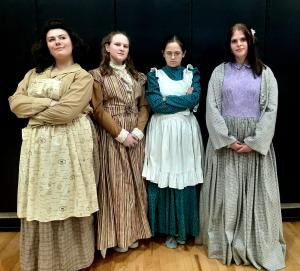
Life Lessons from Little Women
This week I am directing our high school spring drama: Little Women. It is not a specifically Christian play, so I was curious about how we might treat it in a Christian high school. The fact that it was never one of my favorite pieces of literature (sorry) made directing a challenge. However, spending so much time with “Meg,” “Jo,” “Beth,” and “Amy” these last few months has given me some insight and appreciation for Louisa May Alcott’s coming of age story. I am grateful for the life lessons from Little Women.
Published in 1868, the plot of Little Women follows the lives of the four March sisters and details their passage from childhood to womanhood in Civil War era Massachusetts. Loosely based on the lives of the author and her three sisters, it is classified as an autobiographical or semi-autobiographical novel. It has been adapted for stage and screen many times, but I had never considered the life lessons from Little Women.
In the last several months, I have come to appreciate the fact that the story goes far beyond sisterly drama. There are important lessons wrapped in its pages. Since I am writing from the perspective of a stage production, I will share the life lessons I have gleaned from that:
Life Lesson #1: Accepting the differences of others
Romans 12:6-8: We have different gifts, according to the grace given to each of us. If your gift is prophesying, then prophesy in accordance with your faith; if it is serving, then serve; if it is teaching, then teach; if it is to encourage, then give encouragement; if it is giving, then give generously; if it is to lead, do it diligently; if it is to show mercy, do it cheerfully.
Ever notice how amazing it is that children born of the same two parents and raised in the same home can be so different? It was true with my own children. It is also true with the March sisters.
Meg, the oldest, takes the running of the household seriously. She is concerned about proper etiquette, speech, and acceptable conduct. However, she also has a dreamy romantic side and an appreciation of elegance.
Jo is creative–a writer and a tomboy. She has a rebellious streak in that she is disappointed at her female status. She desires to venture into the world and do the things “boys” customarily do, like soldiering. It frustrates her to think of being caged into the traditional role of a 19th-century woman.
Alcott describes Beth as kind, sweet, gentle, shy, quiet, peaceful, and musical. She is known for her pleasant ways and generous nature. She is also optimistic, even as she faces her own sickness and death.
Amy is the traditional “baby of the family”–spoiled and self-centered. She bitterly regrets what others have that she does not and is quick to compare. However, she is also romantic and artistic. She has good manners, particularly compared to Jo.
Even when there is not a crisis going on, the girls, who are so different, sometimes butt heads. There are moments of anger, jealousy, and rivalry between them. Still, it all points to lesson #2–they realize that they love each other and that family is important.
Life Lesson #2: Family is important
Proverbs 17:17 “Friends love all the time, and kinsfolk are born for times of trouble.”
Psalm 133:1 “Look at how good and pleasing it is when families live together as one. ”
“The March sisters are depicted as being very close-knit and supportive of each other. They spend their time reading, writing, and putting on plays, which not only entertains them but also serves as a means of escaping their mundane lives. The March sisters’ bond is further reinforced by their mother, who plays a pivotal role in their upbringing, teaching them the importance of kindness, generosity, and hard work.
“The theme of family is further developed through the interactions between the March sisters and their friends and acquaintances. Jo’s friendship with the wealthy and sophisticated Laurie serves as a stark contrast to her family’s more modest lifestyle. Through Jo and Laurie’s relationship, Alcott explores the idea that family isn’t just about blood ties, but also about the people who love and support us. Similarly, the March sisters’ relationship with their neighbor, Mr. Laurence, who takes on a paternal role in their lives, further emphasizes the importance of having a supportive family unit.”
When we have the love and support of family, we are much better equipped to face lesson #3: Sometimes, life is just hard.
Life Lesson #3: Sometimes life is just hard
John 16:33: I have said these things to you, that in Me you may have peace. In the world you will have tribulation. But take heart; I have overcome the world.
The March family was well-to-do until Mr. March lost his property in trying to help an “unfortunate friend.” Amy, the only March child still attending school, “is teased for wearing hand-me-down dresses and having a father who “isn’t rich” (Alcott). Because of their financial predicament, Mr. March is serving as a soldier in the Union Army.
The country, including the March family, becomes plagued by dreadful sickness. In the 1800s, scarlet fever is the cause of much suffering and death. The Hummel family, to whom the March family is extending charity, loses a new-born baby to the disease. Then, tragically, it spreads to Beth.
Mr. March also comes home from the war sick and injured. Marmee has to go to Washington to care for him and leave the girls to run things at home.
War, poverty, sickness, death, anger–we are not strangers to the concepts.
In this present evil age, we are faced daily with issues and challenges we could never have imagined, even twenty years ago. But as we trust in the fact that God has not deserted the throne and is in full knowledge and control of the world, in the midst of chaos, we can find peace.
Life Lesson #4: Gratitude for what you have
Philippians 4:6: Do not be anxious about anything, but in every situation, by prayer and petition, with thanksgiving, present your requests to God.
In a play that explores loss–loss of fortune, loss of dreams, loss of life–it is important that gratitude is also thematic. Without their tendency toward gratitude to God, the characters’ lives would have been dreadfully tragic. Instead, the family places their faith in a power higher than themselves, believing that all will indeed work out for the best.
Artisha T. Bolding writes, “Gratitude is not just a feeling, it’s a choice. It’s a choice to acknowledge the Source of all our blessings, and to respond with generosity and kindness. It’s a choice to live with joy and peace, and to spread that to others. It’s a choice to honor God, and to glorify Him with our lives.” That is how the March family survives the challenges that beset them.
It is the same as we trust God with our future. The promise is that He will do exceedingly abundantly above all that we ask or imagine. For that reason, we can pursue our callings, because (Life Lesson #5) hopes and dreams are important.
Life Lesson #5: Hopes and dreams are important
Philippians 1:6: Being confident of this, that he who began a good work in you will carry it on to completion until the day of Christ Jesus.
Meg is hopeful for love; Jo is confident in her calling; Beth is certain of heaven; Amy is happily provided for. In the end, the girls’ dreams are fulfilled in ways they could not imagine in the beginning.
God has placed in each of us a plan and a purpose, and over the course of a lifetime, we seek them out and seek to fulfill them. Those plans and purposes are part of what makes us unique and individual. To quote Gissane Sophia, “Whether a woman wants to be a housewife or a world traveling actress or an educator or a cook, no matter how foreign or bizarre the idea is to our beliefs, it’s our duty to appreciate one another and the different dreams that make us unique and wonderful.”
Guess what!
That brings us right back to Life Lesson #1!
God bless you, and may you celebrate all that is your life today.
















